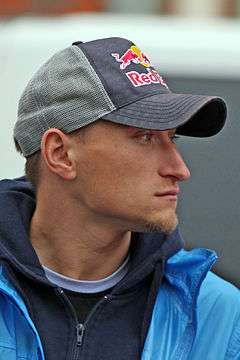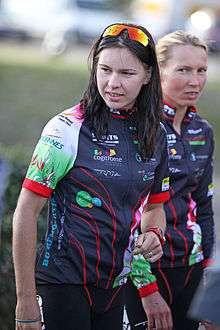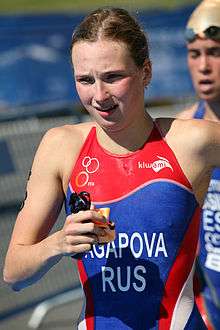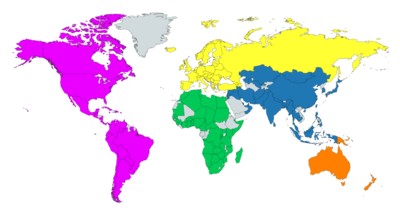Russian Triathlon Federation
The Russian Triathlon Federation (Федерация триатлона России) is the official national governing body for the sports of triathlon, duathlon and winter triathlon and represents Russia in the ITU.









Structure
The president of the RTF is Sergey Bystrov (Russian Сергей Алексеевич Быстров, born 13 April 1957 in Tver Oblast). In 2000, Bystrov was the vice coordinator of Putin's election campaign in Tver Oblast, from 2001 to 2004 he was Vice Minister of Labour and Social Development, from 2004 on he has worked in various functions in the Ministry of Transport and has been in charge of the infrastructure and logistics department for the Olympic Games in Sochi.
National Team 2011
- Elite Male: Alexander Bryukhankov, Ivan Vasiliev, Yulian Malyshev, Valentin Meshcheryakov, Artem (Artyom) Parienko, Vyacheslav Pimenov, Dmitry Polyanski, Vladimir Turbayevskiy, Ivan Tutukin; reserve: Andrey Bryukhankov, Denis Vasiliev, Ivan Kalashnikov, Anton Kozlov, Andrey Lyackiy, Igor Polyanskiy, Anatoliy Fedotov, Dmitriy Esaulov.
- Elite Female: Irina Abysova, Anna Burova, Elena Danilova, Olga Dmitrieva, Lyubov Ivanovskaya, Anastasiya Polyanskaya, Alexandra Razarenova; reserve: Yevgeniya Sukhoruchenkova, Svetlana Ushakova, Natalia Shliakhtenko, Mariya Shorets, Arina Shulgina.
- U23 Male (Юниоры): Pavel Agapov, Georgiy Kaurov, Vladimir Kostelcev, Maxim Nikiforov, Denis Seliverstov, Dmitry Khabibullin, Daniil Khvatov, Alexey Khmelevskiy
- U23 Female (Юниорки): Olga Agapova, Alena (Alyona) Adanichkina, Anastasiya Vasilieva, Zoya Kacheyeva, Anastasia Protasenya, Anastasiya Uvarova,
- Junior Male (Юноши): Egor Astakhov, Dmitriy Baruzdin, Ilya Vidineyev, Dmitriy Litvyakov, Mikhail Neznamov, Ilya Prasolov, Alexander Shcherbinin, Svyatoslav Yurgel;
- Junior Female (Девушки): Anastasiya Gorbunova, Evgeniya Zalogina, Mariya Molyarova, Alena (Alyona) Polukhanova, Ekaterina Rodkina, Anastasiya Shakhmatova;
World Championships (Elite)
In the year before the Olympic Games in London 2012, two male triathletes and one female triathlete have emerged as the greatest Olympic hopes: Alexander Bryukhankov, Dmitry Polyanski, and Irina Abysova:
| Year | Russian Male Triathletes | Russian Female Triathletes |
|---|---|---|
| World Championship Series 2011 | Alexander Bryukhankov (5th) | Irina Abysova (47th) |
| Dmitry Polyanski (8th) | Alexandra Razarenova (62nd) | |
| Artem Parienko (30th) | Mariya Shorets (66th) | |
| Ivan Vasiliev (31st) | Anna Burova (84th) | |
| Ivan Tutukin (32nd) | Anastasiya Polyanskaya (93rd) | |
| Valentin Meshcheryakov (46th) | Lyubov Ivanovskaya (107th) | |
| Igor Polyansky (49th) | Inna Tsyganok (117th) | |
| Vladimir Turbaevsky (52nd) | ||
| Yulian Malyshev (97th) | ||
| Andrey Bryukhankov (133rd) | ||
| World Championship Series 2010 | Alexander Bryukhankov (8th) | Irina Abysova (52nd) |
| Dmitry Polyanski (14th) | Alexandra Razarenova (56th) | |
| Valentin Meshcheryakov (17th) | Anastasiya Polyanskaya (64th) | |
| Vladimir Turbayevskiy (20th) | Olga Dmitrieva (88th) | |
| Yulian Malyshev (30th) | Yevgeniya Sukhoruchenkova (102nd) | |
| Ivan Tutukin (36th) | ||
| Ivan Vasiliev (45th) | ||
| Anton Chuchko (84th) | ||
| Igor Sysoev (104th) | ||
| Igor Polyanskiy (131st) | ||
| World Championship Series 2009 | Dmitry Polyanski (9th) | Irina Abysova (30th) |
| Alexander Bryukhankov (11th) | Olga Dmitrieva (63rd) | |
| Yulian Malyshev (15th) | Anastasiya Polyanskaya (102nd) | |
| Ivan Vasiliev (19th) | ||
| Vladimir Turbaevsky (33rd) | ||
| Ivan Tutukin (38th) | ||
| Ivan Vasiliev (50th) | ||
| Artem Parienko (88th) | ||
| Igor Sysoyev (92nd) | ||
| BG World Championships Vancouver 2008 | Igor Sysoyev (7th) | Olga Zausaylova (23rd) |
| Ivan Vasiliev (10th) | Irina Abysova (26th) | |
| Dmitry Polyanski (11th) | ||
| Yulian Malyshev (36th) | ||
| BG World Championships Hamburg 2007 | Igor Sysoyev (17th) | Irina Abysova (32nd) |
| Vladimir Turbaevsky (63rd) | Evgeniya Matveeva (46th) | |
| Dmitry Polyanski (DNF) | Olga Zausaylova (57th) | |
| Olga Dmitrieva (60th) | ||
| World Championships Lausanne 2006 | Igor Sysoyev (24th) | Irina Abysova (32nd) |
| Olga Zausaylova (37th) | ||
| Olga Dmitrieva (59th) | ||
| Olga Generalova (DNF) | ||
| Anastasiya Polyanskaya (DNF) | ||
| World Championships Gamagori 2005 | Igor Sysoyev (31st) | — |
| World Championships Madeira 2004 | Igor Sysoyev (5th) | Olga Generalova (24th) |
| Ivan Vasiliev (23rd) | Nina Anisimova (31st) | |
| World Championships Queenstown 2003 | Ivan Vasiliev (DNF) | — |
| World Championships Cancun 2002 | — | Nina Anisimova (35th) |
Olympic Games
Igor Sysoyev took part in two Olympic Games and can be considered Russia's most successful triathlete of the last decade. His wife Irina Abysova, who has been the dominating figure among the Russian female triathletes of the last decade, had a bad bike accident and was seriously injured in Beijing. According to her World Championship results, Abysova should have achieved a good Olympic Games result as well.
| Year | Russian Male Triathletes | Russian Female Triathletes |
|---|---|---|
| Olympic Games Beijing 2008 | Igor Sysoyev (9th) | Olga Zausaylova (36th) |
| Dmitry Polyanski (22nd) | Irina Abysova (DNF) | |
| Alexander Bryukhankov (24th) | ||
| Olympic Games Athens 2004 | Igor Sysoyev (15th) | Olga Generalova (31st) |
| Nina Anisimova (DNF) | ||
| Olympic Games Sydney 2000 | Nina Anisimova (12th) |
Trivia
The RTF is not only one of the biggest triathlon federations, the RTF also seems to be one of the influential federations, as some incidents suggest:
- Inna Tsyganok, a Ukrainian born Russian triathlete, was allowed to take part in various ITU competitions «representing ITU» because, when moving to Russia, she obviously did not fulfil the nationality criteria for about half a year and should not have been allowed to participate in any ITU events. The ITU did not answer to questions as to why Tsyganok «represented ITU» without a nationality.
- Anastasiya Gorbunova, a clear DNS case at the Junior European Cup triathlon in Tabor (31 July 2011),[1] was eliminated not only in the ITU result list, but also in the ITU start lists immediately after the triathlon in order to prevent her from being cancelled in the start list of the European Youth Championships in Lausanne. According to the Continental Cup rules, a triathlete who withdraws too late must be removed from all start lists for the next 30 days,[2] hence Gorbunova, the best Russian female junior triathlete, should have been banned from the Youth Triathlon European Championships in Lausanne (27 August 2011). Gorbunova was present in full armour at the check in and the line up but did not go to the pontoon when her start number (83) was called. The ITU does not answer to inquiries as to why Gorbunova was eliminated after the race even in the ITU start list.
- Surprisingly, a local Russian Cup triathlon in Penza was upgraded to a European Cup (3 July 2011) and Junior European Cup (2 July 2011) triathlon although the official ETU calendar did not include any ETU competitions in Russia.[3] All international competitors being absent from this local event, the Russian participants could easily gain points in the ETU and ITU rankings.
- National female triathlon team (with Irina Abysova among other athletes) was sponsored for two seasons (2012–13,2013–14) by Russian businessman and Ironman triathlete Alexey Cheskidov.[4] In 2014 Mr. Cheskidov founded the first series of amateur triathlon and marathon events in Bronnitsy (Moscow Region). The series was called Titan with its logo and concept being highly influenced (or inspired) by non-present in Russia Ironman Triathlon and World Triathlon Corporation.[5][6]
References
- See Official Result List. Retrieved 10 September 2011.
- See p. 65, ITU Competition Rules.
- See «ETU announces 2011 Race Programme», 17 November 2010. Retrieved 10 September 2011.
- "Стартовая цена: как заработать на организации спортивных мероприятий" (in Russian). Forbes, Russia. 2014-10-03. Retrieved 2016-01-11.
- "Лицензия ФТР (Russian Triathlon Federation license)" (in Russian). TITAN (official site). Archived from the original on 2016-01-31. Retrieved 2016-01-11.
- "«ТИТАН триатлон», железная дистанция, спринт 2016" (in Russian). Russian Triathlon News Portal - Trilife.ru. 2015-10-14. Archived from the original on 2016-01-31. Retrieved 2016-01-11.

